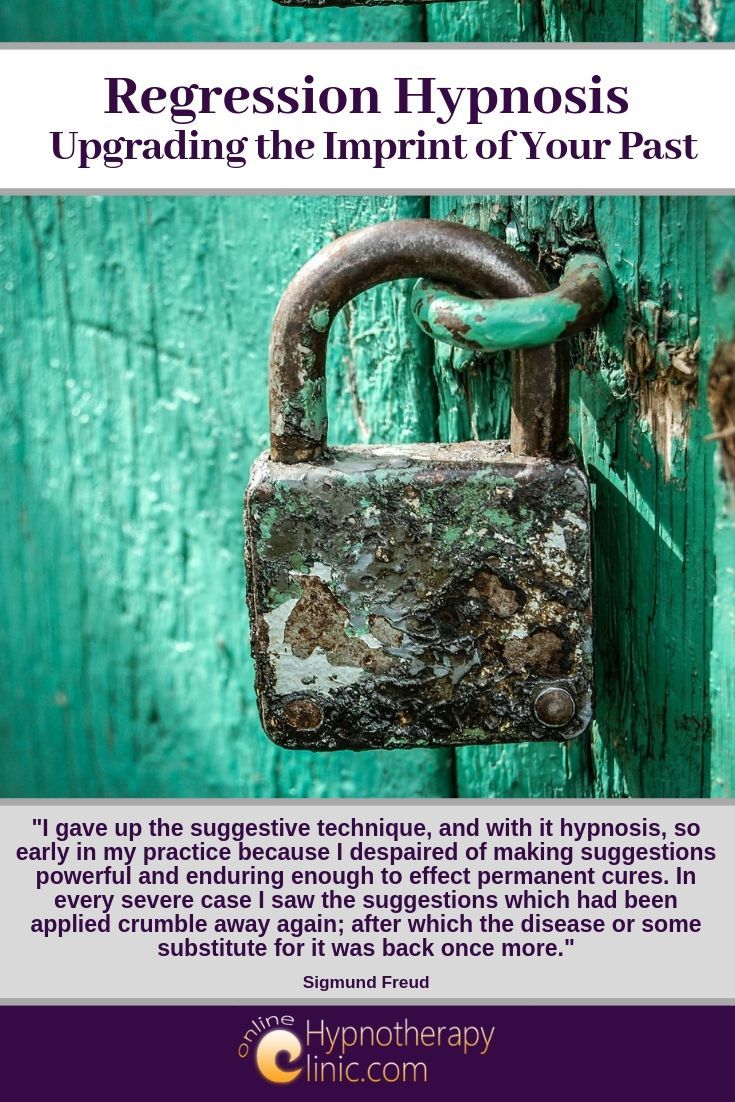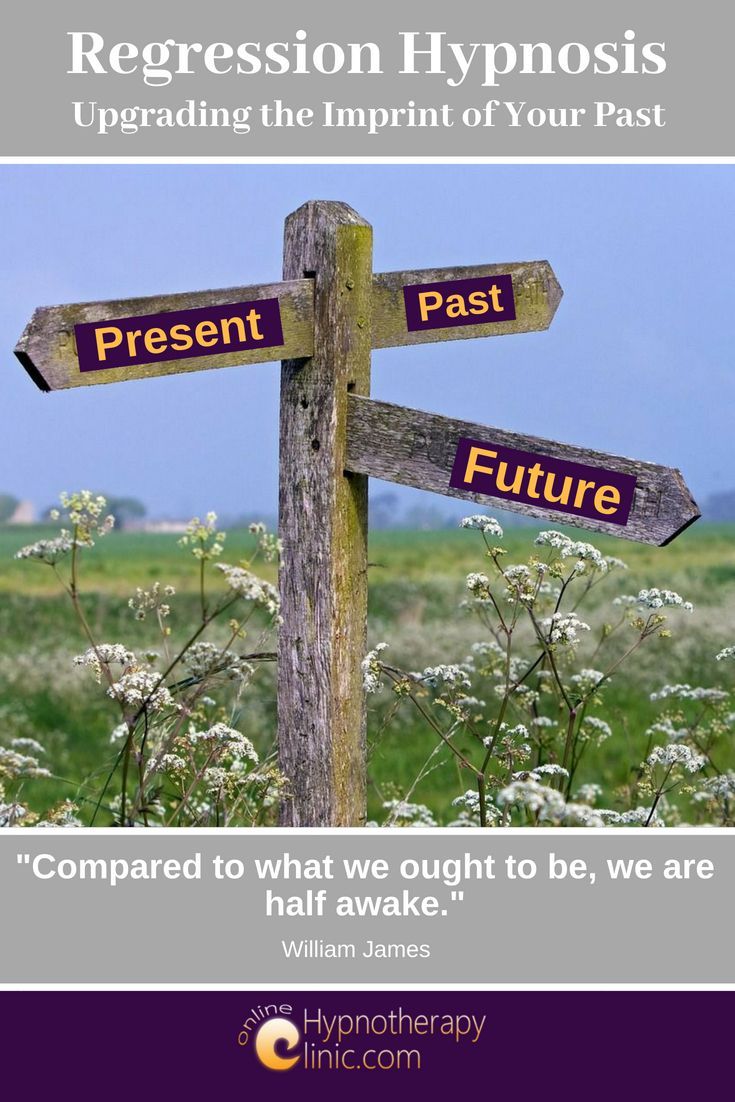Regression Hypnosis- Upgrading the Imprint of Your Past
By Susanna Sweeney, MSC, MBACP, CHT
Regression hypnosis is the backbone of the work when healing complex issues with hypnotherapy such as depression, anxiety, lack of confidence, self esteem. Even without any such dramatic issues present, regression can work wonders for you when you come up against an internal block that you find you simply cannot shift by yourself.
In this article, I want to help you understand:
- How such deep personal issues arise
- How regression hypnosis can help to shift them
- Why you cannot do this work with coaching or psychotherapy alone (psychotherapist speaking from long years of experience)
Bear with me and expect to find answers to your questions:
- If regression hypnosis is safe
- If regression hypnosis is suitable for you
- What Past life regression is all about
- If there is any scientific evidence that backs up this work
To start this process, let’s first of all look at how deep personal issues arise. What I will describe holds true for any stubborn blocks you may come up against in yourself, but also stretches to mental health issues such as depression, anxiety, low self esteem and confidence. From my observation, the underlying principles are always the same.
Where Do Deep Personal Issues Originate?
In my article on hypnosis therapy for anxiety,
I used an example based on my client work which illustrates in concrete
terms how deep personal issues can arise in someone’s life. Here, I
will talk in general and more theoretical terms, but hopefully in such a
way that you will be able to follow easily.
Mostly, the development of these sorts of issues is set off very early in life, usually before the age of seven.
As
an evolutionary default, young minds, before the age of around seven,
are wide open to their parent’s programming. Nature has made this so
that we can condition the next generation to survive depending on the
particular circumstances of our lives.
We can imprint upon our
children what dangers to avoid, and what behaviors are conducive to
their well being. If this programming occurs before the age of seven,
the imprint will go straight to the subconscious mind. It will go in
deep and the child will carry on the desired behaviors without ever
questioning them.
You can now see how this is an important evolutionary feature for the survival of our species.
However, this clever feature also brings with it certain side effects.
Say,
an overwhelming event occurs at that young age. This could be an event
that frightens the child, makes them feel abandoned, or even makes them
feel their life is at risk. The memory associated with this overwhelming
event will also be stored directly in the subconscious mind.
If
such an event occurs before the age of around seven, there is no chance
the child will be able to process it or make sense of it simply because
children’s brains are not developed enough to process complex
situations.
If a complex, confusing or frightening event occurs, children will:
- Blame themselves for the event (because they are dependent on their caregivers and therefore cannot ever see them as being at fault)
- Suppress any complex feelings such as anger, fear or grief
- Often have no conscious memory of the event
However, not having a conscious memory of the event does not equate the
event not having an impact. The subconscious mind will remember. And the
sensemaking system I described in the list above, with self blame at
its core, will be used ever more when dealing with situations that are
interpreted as being similar, shaping emotions and behaviors.
Now
the real difficulty occurs because the gates to the subconscious mind
close at around age seven. From then on, reprogramming becomes much more
difficult.
When the child encounters maybe only one or two
such events during childhood, the impact could lead to blocks that
manifest later in life.
When such events occur frequently or are severe enough, the impact could lead to depression, anxiety, low self esteem or confidence becoming an issue later in life.
How Can Regression Hypnosis Help?
Regression hypnosis is a wonderful tool that can help repair this
damage. Regression hypnosis allows you to work directly with the
subconscious mind on integrating memories which are otherwise
inaccessible.
With regression, hypnosis really comes into its own
as a unique method with a far superior tool kit to anything I have seen
in any other form of therapeutic work.
This is because the
slightly altered state of consciousness we call hypnosis allows
different parts of your brain that would not normally communicate, to
exchange information (1) opening the door to a great number of changes
that can be made- literally- to your brain while you are in hypnosis.
What Regression Hypnosis Does
Memories are organised thematically in the human mind. Say, for example, a client, let’s call him Frank, attends hypnosis because he feels blocked in progressing his career. He just cannot garner the confidence to move up to the next level in his job.
In regression hypnosis, the hypnotist would:
- Facilitate Frank to connect with the feelings attached to this state of low confidence
- Once Frank can really feel those feelings, the hypnotist can facilitate Frank to travel back the chain of memories associated with this state
- The memories Frank will uncover in regression hypnosis will typically be around the same theme. He would uncover events that he interpreted (in his child’s mind) in such a way that he developed low confidence as a result.
- The hypnotist will aim to bring Frank back to the very first time this state occurred in order to fully unravel the memory chain
- Sometimes, when targeting the very source of the presenting issue, people don’t come back with experiences from their childhood, but rather with so called ‘past life’ experiences. I process these in the same way as any other memory.
(You can read about my take on past life hypnosis here.)
For each memory, using the adult’s mind Frank now has the hypnotist will:
- Facilitate Frank to feel the feelings he could not feel at the time
- To remove any self blame
- To fully understand the complexities involved
- To do all this on a deep level that involves the subconscious mind
Once this work is done for all incidents including the very first time
this occurred, Frank will have freed himself of the hold the past had
over him. The block will be removed. His subconscious thinking and his
emotions will change, allowing him to unfold his full potential. Frank
will then be free to design his life in the present moment as he
desires.
(This article here in Psychology Today may interest you. It agrees with me on the benefits of regression hypnosis.)
"Can I not just do this in my Conscious Mind?"
“All of this sounds very simple to do”, I can hear you thinking. “I
should be able to get there by just thinking things through logically.
Once I understand what the issue or problem is, that should solve it,
surely?”
Unfortunately not.
The caveat here is that there are different levels to understanding. Consciously understanding something does not equate subconsciously understanding it.
If you take only one point with you from this article, let it be this one very important point:
The crux of the matter is that:
- The issue resides in the subconscious mind.
- In adulthood the gates to the subconscious mind are closed which results in an inability of the conscious and subconscious minds to exchange information about the memory.
- If you want to resolve an issue residing in the subconscious mind, you must work directly with the subconscious mind, which, by default, requires a slightly altered state.
These are some examples that would tell you that you are dealing with a block at the subconscious level that you cannot resolve by applying logical thinking:
When you have some conscious memory:
- You can think logically that you were not to blame, but you still feel that you were.
- You can think you have let go of anger, but you find yourself acting out.
- You think you have forgiven, but you don’t feel any relief and your life does not change for the better.
Examples for when you have no conscious memory:
- You feel overwhelmed, anxious, afraid or angry and you don’t know why.
- You know you should be able to do this job but find it impossible to tap into your resources.
- You have always been able to do a particular task or job but suddenly there is a block and you can no longer perform, and you don’t know why.
- You experience fear of a new job, project or stage in life. This is in conflict with how you normally see yourself and you cannot make sense of it.
You can now see how achieving changes on a deep emotional level is a different ballgame to having a conscious understanding or appreciation of the issue. The only way to change issues at a subconscious level is by actually working with the subconscious mind.
Regression Hypnosis is a Superior Tool for Shifting Issues at a Subconscious Level:
- It is the best tool for this job that I have come across in my many years around the healing world
- Regression hypnosis allows you to laser target particular memory strings attached to the presenting issue.
- It allows for communication to take place between the conscious and subconscious minds in order to resolve the block.
- Work with regression hypnosis is safe, effective, very well contained and easy to integrate.
Why You Cannot do this Work with Coaching Alone
If you have worked with a coach before you will know that coaching work
is focused on changing your behavior in the present moment. Coaches are
not trained to work with the subconscious mind.
Your coach will help you:
- To cognitively understand new concepts
- To give you tasks to do
- To coax you to take the next step
- To teach you useful skills
All of this amounts to very worthwhile support, but it cannot help you with overcoming deeply seated blocks that involve the subconscious mind.
Why You Cannot do This Work with Psychotherapy Alone
The Strengths of Psychotherapy
Psychotherapy, when done well, will provide a secure connection with the
therapist, a safe place to express emotions and troubling thoughts, a
place to gain cognitive understanding about yourself, a place of holding
during a crisis period, a place that can help you integrate troubling
childhood memories, or perhaps, if nothing major is bothering you, a
place where you can reflect and become curious about yourself.
Again, these are all very worthwhile supports. But can psychotherapy help you to resolve issues held in the subconscious mind?
The Limits of Psychotherapy
Psychotherapy, no matter what school is involved, is essentially talk therapy.
You talk to your therapist. You talk about issues. You talk about
emotions. You talk about body sensations. With someone who is trained in
process work, you may experience a certain amount, but by enlarge you
will ‘talk about’ a lot.
And while you are talking, you
are operating from the conscious mind. And the conscious mind has strong
defenses built all around it that make sure that change in adult life
becomes very difficult. (You can read about these defenses in detail in
my article on suggestion hypnosis.)
Essentially,
in psychotherapy you are constantly working with a paradox. You are
working with the conscious mind while you are really trying to access
the subconscious.
If you work with a good and experienced
psychotherapist and if you can get around the defenses enough, you will
be able to catch some glimpses of the underlying subconscious material
from time to time.
But these, in my experience, remain isolated
glimpses. A certain amount of change can be affected with psychotherapy,
but very often people come to the limit where they find they are no
longer making progress.
If or when this occurs for you, consider giving regression hypnosis a go.
Is Regression Hypnosis Safe?
False Memory Syndrome
Regression hypnosis has attracted some bad press in the past when
it’s been associated with the controversial ‘False Memory Syndrome’.
It
is not possible for me to cover this topic in depth in this brief
article. Suffice to say that any well trained, experienced and ethical
psychotherapist or hypnotherapist will steer clear of making any
suggestions to their client what the nature of the memory to be
uncovered is or may be.
Rather, protocols for regression hypnosis are typically carefully designed to facilitate the client discovering memories on their own. The client is also left to interpret the memories on their own. The hypnotist acts as a mere facilitator in the process, asking questions and giving prompts for the next step.
The fear of false memories is also closely linked to one of the most prominent hypnosis myths that hypnosis is a tool for accurate recovery of memories. Rather, I find it much more useful to focus of the theme underlying the memories that emerge during regression hypnosis.
In the example above, Frank's theme was around memories that made him feel unworthy. I see my task as a hypnotherapist as helping him to process the theme. In that context, the particulars of the memories that emerge are not all that important.
Fears of Overwhelm
Some people fear they might become overwhelmed by
hypnosis. Again, this fear often has to do with internalized hypnosis
myths which are useful to explode before you embark on regression
hypnosis.
One such myth is that regression hypnosis supposedly
stirs up traumatic memory in an uncontained and chaotic way which could
lead to the client going into crisis.
While there are some people
who regression hypnosis won’t be suitable for, and who should not
attempt it because it may cause problems for them- in my experience,
nothing could be further from the truth.
In my experience, regression hypnosis facilitates integration
much better than many other forms of regression work that I have seen
in action in my time around the healing world, including Holotropic
Breathwork and Rebirthing. Typically hypnosis clients will leave the
session feeling grounded and able to return to their everyday lives,
even if the memories they dealt with in the session were quite heavy.
In
summary, it is that in my experience, this work is very safe and very
contained. You should take care however, to pick a suitable
practitioner to work with. Find some tips on this and on how to get the best from this work in my article on life regression hypnosis.
Is Regression Hypnosis Suitable for You?
Regression hypnosis is not suitable for you if:
- You suffer from epilepsy
- You have psychotic symptoms such as hearing voices
- You have been diagnosed with Dissociative Identity disorder (DID), (unless you found a psychiatrist, psychologist or psychotherapist who was trained in both working with DID and hypnosis)
In addition, if you are currently taking medication for depression or anxiety, you won’t get the best results because such medications are designed to suppress emotions.
If this was the case for you you could:
- Work with suggestion hypnosis which would be perfectly safe for you
- Discuss your intentions to undertake hypnosis treatment with your doctor
- Disuuss reducing or stopping of medication (as appropriate) with your doctor
- Consider regression hypnosis once you are free of medication
Is There any Scientific Evidence that Regression Hypnosis Works?
One piece of hypnosis research I came across, however, made a lot of sense to me. This piece of research was by David Spiegel who used brain imaging techniques to pin down what features are characteristic of the state of hypnosis.
One of those features was the ability for certain parts of the brain to communicate that normally don’t. And from observation, that is exactly what appears to be happening in regression sessions.
I believe that science is only in its infancy when it comes to researching what exactly happens in the brain, and how this connects to emotions and body sensations in particular. Over the next decade we may see a lot more studies, now that modern brain imaging techniques have become available to assist in research.
What is Hypnosis? Other Articles on This Topic
Understand the Basics
Discover the Power of Hypnosis
Discover the power of hypnosis through 10 amazing facts about hypnosis you most likely have not heard before.
Six Wonderful Benefits of Hypnosis for Creating the Life you Love
Find out the benefits of hypnosis over coaching and traditional talk psychotherapy in helping you change your life for the better and achieving your goals.
You may have heard anecdotal reports about hypnosis being nothing more than unscientific ‘mumbo-jumbo’ which might have planted this question in your mind. So, does hypnotherapy work? Find out my answer to this charged question, and it probably isn't what you would expect.
The 3 Worst Mistakes Hypnotists Make
Find out the three worst mistakes any hypnotist can make so that you can avoid them and find the right hypnotist for you.
Evolution has given humans a powerful tool that enables us to be the most dominant species on the planet- yet this tool contains a critical flaw that is limiting many people and preventing them from living their dream. This may be limiting you, too...
The Secret Language of Hypnotherapy
Learn the secret language of hypnotherapy geared towards the requirements of your subconscious mind so that you can reach your goals more easily.
Find out the most common issues that hypnosis can help you with and see what you could do with hypnosis to change your life.
This article is a great starting point to understanding what to expect from hypnotherapy treatment, including what you can do to get the most from your treatment.
Hypnosis has been shrouded in mystery. There are many myths or, simply, false beliefs attached to hypnosis. You, too, have likely picked up a few of them as they are ‘around’ in public consciousness. Let me bust those myths for you so you can be free to enjoy and appreciate hypnosis for what it is.
Hypnosis or Self Hypnosis Trance
Hypnotic trance is referred to with much mystery. Is it really that spooky? Allow me to talk you through what the experience is like.
Hypnosis Methods and Ways of Working
This article covers everything you want to know about suggestion hypnosis, including what it is, what it can do for you, how it works, what techniques are used and how you can get the very best out of it. Suggestion hypnosis can help you to reach your goals and change your life.
Regression Hypnosis can help you to clear blocks relating to the past which are causing you trouble now. Find out how it works, how it compares to coaching and psychotherapy and see if it is suitable for you.
This article fills you in on how you can get the very best from regression hypnosis and is a must read if you are thinking of embarking on hypnotherapy treatment for a complex personal issue.
Some hypnotists offer specific sessions to uncover past life memories. Is this a good idea? Find out what my thinking is on how to get the best results from past life hypnosis.
Does online hypnotherapy work or is it inferior to face to face work as some people say? Find out what's involved and form your own opinion about advantages and disadvantages working online with us.
What is Havening and how Can it Help you Change Your Life?
Find out about a novel psychosensory treatment we combine with hypnosis which can help you clear trauma, fears, phobias, anxiety, low self esteem and more while also supporting you in building resilience and positive emotions.
Discover how well hypnosis could work for changing your particular bad habit and how you can make it into a starting point for changing your life.
Hypnosis for Permanent Rapid Change
No more scripts. The new way to work with live issues. It's dynamic, fast, gentle and powerful.
Self Help Hypnosis Articles
Can you help yourself with hypnosis? Find out here...
You will find this question answered but in a way you probably would not expect. Find out how self hypnosis is always at work, whether you harness it as a skill or not...
The Benefits of Self Hypnosis
Find out in this article how you can benefit from self hypnosis in your life, including what issues you can use it for.
Self-Hypnosis Relaxation Techniques
A good place to start practicing self hypnosis techniques first before infusing them with images regarding your specific goals, or changes that you want to make in your life is with relaxation techniques. Find a sample relaxation script on this page that you can start using today.
Self Hypnosis for Goal Setting
Goal setting is key in working with personal goals. If you don’t get your goals just right, you are much less likely to get good results. Find out how to overcome the seven most common mistakes with goal setting when you use a self hypnosis based approach.
Self-Help Hypnosis- 7 Challenges and How to Overcome Them
Like any other form of therapy, self-help hypnosis, too has some limitations which you should be aware of before you start practicing. I also offer some practical tips and solutions to help you overcome most of these limitations.
Auto Suggestions
In this article, find out the history of auto suggestions, the science behind them and how you can use them to your advantage to change your life.
In this article, find detailed instructions on how to design, administer and troubleshoot your auto suggestions successfully so that you can use them to change your life.
I hope you have found this article on regression hypnosis illuminating. I was my goal to shed some light on the mystery. Please follow up on the links I provided for further reading.
Regards,

Recent Articles
-
Havening Technique Training auf Deutsch
Apr 18, 25 02:59 AM
Havening Technique Training auf Deutsch- Details und Buchung -
Client Testimonials
Oct 06, 23 06:08 AM
Client Testimonials of my Online REPAIRenting® Program that uses various psychosensory approaches for safe and quick transformation -
Smoke Free Thanks to This Amazing Resource
Aug 02, 23 09:26 AM
Oh thank you for this simple resolution to all my worries! I feel like I have had a weight lifted off my shoulders. It is like cheating on giving up smoking.




New! Comments
What do you think? Leave a comment in the box below.